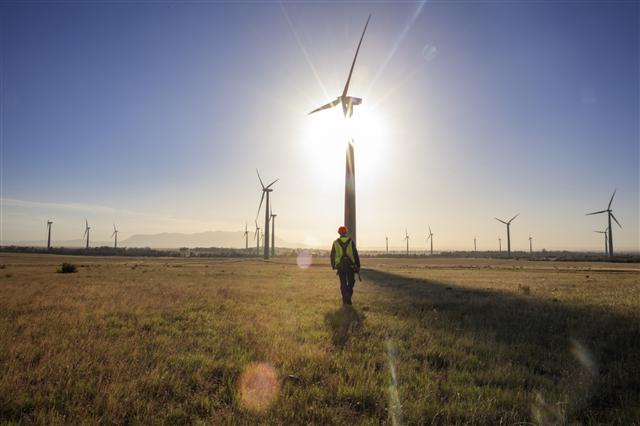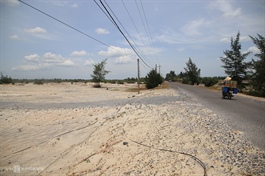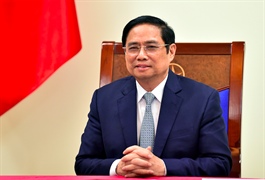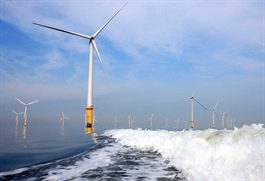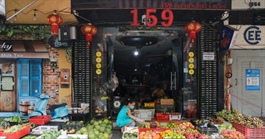HSBC blows green support to Vietnam's wind energy sector
HSBC blows green support to Vietnam's wind energy sector
HSBC Bank (Vietnam) Ltd. (HSBC Vietnam) has confirmed its agreement in providing the short-term green trade finance in renewable energy construction for Power Construction Joint Stock Company No.1 (PCC1), a leading Vietnamese EPC company in power construction. This is the first sustainable finance that HSBC offers to a local corporate in wind sector in particular and the third one for Vietnamese businesses in renewable energy, after two green facilities provided to REE for their rooftop solar project last year.
In this very first cooperation, PCC1 has been working closely with HSBC Vietnam to go through HSBC’s stringent credit approval and management process of sustainable financing controlled by HSBC Asia Pacific Sustainable Loans Committee, the dedicated body of the bank with rich experience in successfully arranging green financing in different fields around the world. The green facility is also required to meet the high standards of the international Green Loan Principles jointly issued by Loan Market Association and Asia Pacific Loan Market Association. It includes four core components: use of proceeds, project selection and evaluation, management of proceeds and reporting. The deal with short-term trade limit will support the corporate’s working capital needs on their Engineering, Procurement and Construction (EPC) activities in wind energy.
|
“The impact of climate change on our planet and people’s livelihood is a generational issue of vital importance. As a leading international financial institution, HSBC has a responsibility to our environment and our communities. Building a more sustainable world is at the core of our values and how we are building capabilities”, shared Stephanie Betant, Head of Wholesale Banking, HSBC Vietnam, “As the global leader in sustainable finance, we are bringing our experience to Vietnam, building local expertise and working with our customers to develop green financing. In Vietnam, we lead the first green loan, the first for renewable energy and now we are particularly excited to provide green financing to PCC1 for wind power, a Vietnamese leader and a promising source of energy for Vietnam’s growing needs and one with high potential given the country’s natural conditions. The transaction also reflects our efforts in supporting the Government’s Resolution No.55/2020 on Vietnam's Energy Development Strategy to 2030 and vision to 2045 to prioritize clean energy. Along with Prime Minister’s Document No.795/2020 to increase by 7GW of wind power to the current electricity planning, there are mass opportunities for investment and development. HSBC is ready to support corporates and investors in this sector.”
Tuan Trinh, Chairman of PCC1, shared, “PCC1 highly appreciates HSBC providing us with the green trade finance. This is not only meaningful in terms of finance for the company’s EPC contract and business in power construction, but also especially in line with its commitments to sustainable development, business activities associated with social responsibility and environment protection of the company.”
Vietnam has seen the highest level of investment in renewable energy across ASEAN. To attract more FDI and provide overseas companies with more sustainable energy, Vietnam has demonstrated a strong commitment to renewables. HSBC Global Research argues that Vietnam offers the best potential for renewable capacity addition across ASEAN, with foreign investments driving growth.
According to The Global Wind Energy Council (GWEC) Market Intelligence’s market outlook released in June 2020, Vietnam is now among top five markets in Asia for new offshore wind installations in 2030, with a total of 5.2GW offshore wind capacity to be built between 2020 and 2030. Asia’s offshore wind is now expected to occupy 42 percent of global offshore wind market in 2025, however, this rate could be more than that when more utility-scale projects get connected in Japan, South Korea and Vietnam in that year. According to the World Bank, among Laos, Thailand, Cambodia and Vietnam, our country is holding the largest wind power development potential. Vietnam Electricity (EVN)’s March report states 4.4GW of wind power projects are under construction while another 6.2GW will be developed from 2022 to 2025.
The huge potential in Vietnam’s renewable energy in general, and wind energy sector in particular opens more opportunities for both energy corporates, investors and financial institutions to play their roles in the boisterous game.
In Vietnam, HSBC has confirmed its green footprints across wide ranges of sustainable products and services through continuous support to both retail and corporate clients. The bank financed a green building in Ho Chi Minh City, provided green credit to Duy Tan for their first plastic recycling factory, the dual green financings for REE on their rooftop solar projects. On retailing side, HSBC Vietnam also supported customers by its green loan for installing rooftop solar energy system at their houses and green home loan. HSBC’s green list will be continuously extended to underscore HSBC’s strong commitment to net zero transition and building a healthier planet for future generations.
| HSBC has been in Vietnam for over 150 years – the bank first opened an office in Saigon (now Ho Chi Minh City) in 1870. HSBC was the first foreign bank to launch its locally incorporated entity on January 1, 2009 as HSBC Bank (Vietnam) Ltd. The bank’s current network includes two branches and five transaction offices in Ho Chi Minh City, one branch and four transaction offices in Hanoi, and two full-service branches in Binh Duong and Da Nang. HSBC is one of the largest foreign banks in the country in terms of investment capital, product range, and customer base. |


